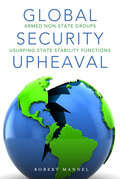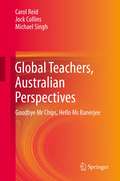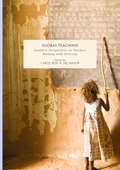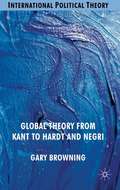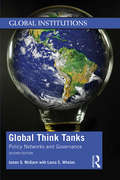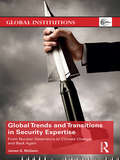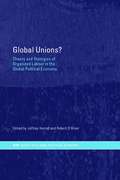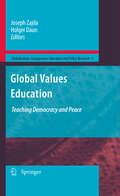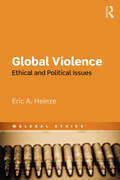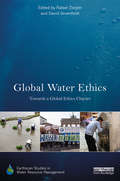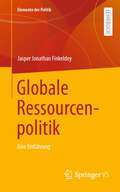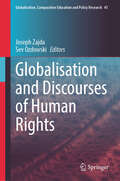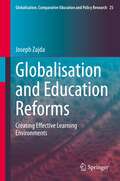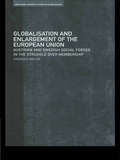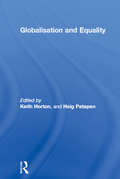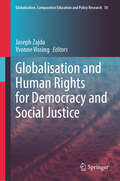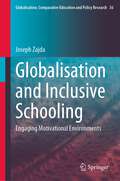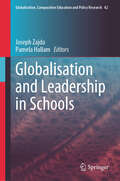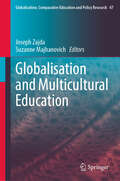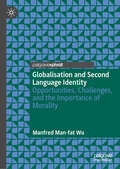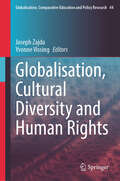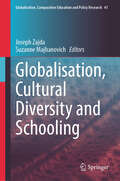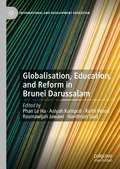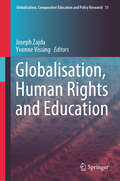- Table View
- List View
Global Security Upheaval: Armed Non-state Groups Usurping State Stability Functions
by Robert MandelThis book calls into question the commonly held contentions that central governments are the most important or even the sole sources of a nation's stability, and that subnational and transnational nonstate forces are a major source of global instability. By assessing recent real-world trends, Mandel reveals that areas exist where it makes little sense to rely on state governments for stability, and that attempts to bolster such governments to promote stability often prove futile. He demonstrates how armed nonstate groups can sometimes provide local stability better than states, and how power-sharing arrangements between states and armed nonstate groups may sometimes be viable. He concludes that these trends in the international setting call for major shifts in our understanding of what constitutes stable governance — proposing that we adopt a fluid "emergent actor" approach. And he calls for significant deviation from standard policy responses to the opportunities and dangers posed by nontraditional sources of national authority.
Global Teachers, Australian Perspectives: Goodbye Mr Chips, Hello Ms Banerjee
by Michael Singh Jock Collins Carol ReidThis is the first book on global teachers and the increasingly important phenomenon of 'brain circulation' in the global teaching profession. A teaching qualification is a passport to an international professional career: the global teacher is found in more and more classrooms around the world today. It is a two-way movement. This book looks at the growing importance of immigrant teachers in western countries today and at teachers who exit from western countries (emigrant teachers) seeking teaching experience in other countries. Drawing on the international literature in Europe, North America, Asia and elsewhere supplemented by rich insights derived from recent Australian research, the book outlines the personal, institutional and structural processes nationally and internationally underlying the increasing global circulation of teachers. It identifies the key drivers of global teacher mobility: a range of factors including family, lifestyle, classroom experience, travel, opportunities for advancement, discipline, linguistic skills, taxation rates, cultural factors and institutional frameworks and policy support. The book is the first detailed contemporary account of the experiences of Australian immigrant and emigrant teachers in the schools and communities where they teach and live. It makes an important and original theoretical and empirical contribution to the contemporary fields of sociology of education and immigration studies.
Global Teaching: Southern Perspectives on Teachers Working with Diversity (Education Dialogues with/in the Global South)
by Carol Reid and Jae MajorAt a time when social, cultural and linguistic diversity has become a characteristic of education systems around the world, this timely text considers how teacher education is responding to these developments in the context of increased mobilities within and across national boundaries. This collection draws together the work of scholars, from a range of urban, rural and national contexts from the Global South and North, who engage in dialogue about diversity and knowledge exchange. It includes perspectives from multiple contexts using a range of frameworks that cohere around attention to issues of equity and social justice, and focuses on the macro level dynamics (policy, theory, global governance) as well as meso (institutional practices) and micro dimensions (professional identities, cultural, and identity transformation). The authors explore these dynamics and dimensions through mobilities of teachers and students, cosmopolitan theory, indigenous epistemologies, language ecology, professional standards policy discourses, and critical analyses of frameworks including postcolonialism, multiculturalism and culturally responsive and relevant pedagogical approaches.
Global Theory from Kant to Hardt and Negri
by Gary BrowningGlobal theory represents an influential and popular means of understanding contemporary social and political phenomena. Human identity and social responsibilities are considered in a global context and in the light of a global human condition. A global perspective is assumed to be new and to supersede preceding social theory. However, if contemporary global theory is influential, its identity, assumptions and novelty are controversial. Global Theory from Kant to Hardt and Negri scrutinises global theory by examining how contemporary global theorists simultaneously draw upon and critique preceding modern theories. It re-thinks contemporary global ideas by relating them to the social thought of Kant, Hegel and Marx, and in so doing highlights divergent ambiguous aspects of contemporary global theories, as well as the continuing impact of the ideas of Kant, Hegel and Marx.
Global Think Tanks: Policy Networks and Governance (Global Institutions)
by James G. McGann Laura C. WhelanThis completely revised edition of Global Think Tanks: Policy Networks and Governance provides a clear description of and context for the global proliferation of think tanks. Presenting an important guide to the factors contributing this spread as well as the future of think tanks at the global, regional, and national level, the book reflects recent trends such as including globalization; digitalization; artificial intelligence; populism; and disinformation. It also includes a new chapter on shifting attitudes towards age and gender. Identifies the forces driving these phenomena by addressing some of the historical and current factors that have dominated policy debates around the world. explores the range of existing global think tanks and a representative group of global public policy networks and conducts detailed profiling of these organizations. extrapolates trends in current think tank research that provide a basis for understanding their impact on policy makers. identifies and critiques the role of global think tanks and global public policy networks in civil society and analyzes the challenges and opportunities facing them. recommends improvements to think tanks and global public policy networks so that they can continue to serve as a catalyst for civic engagement around the world. This book will be of great interest to all students of international relations and international organizations, alongside policy professionals working at think tanks around the world.
Global Trends and Transitions in Security Expertise: From Nuclear Deterrence to Climate Change and Back Again (Global Institutions)
by James G. McGannThe scope of Security and International Affairs research has expanded tremendously since the end of the Cold War to include topics beyond the realm of war studies or military statecraft. The field—once devoted solely to the study of conventional military and nuclear security issues—has diversified to include foci often considered nontraditional, including peace and conflict, political, economic, environmental, and human security. In this exciting new volume, McGann has undertaken a quantitative and qualitative study of SIA think tanks, looking at global and regional trends in their research. He argues that the end of the Cold War marked a fundamental shift within the field of defense and security studies among think tanks and academics. Tracking the evolution of security as understood by researchers and policymakers is vital as the world follows the path of the Four Mores: more issues, more actors, more competition, and more conflict. As we move forward into a world of rapid change and ubiquitous uncertainty, think tanks will only become more prominent and influential. The volume concludes with an assessment of the future of Security and International Affairs studies and raises the possibility of a return to a traditional security focus driven by recent events in Europe and the Middle East. This will be an important resource for students and scholars of security studies, global governance, and think tanks.
Global Unions?: Theory and Strategies of Organized Labour in the Global Political Economy (RIPE Series in Global Political Economy)
by Jeffrey Harrod Robert O’BrienThis edited collection examines the interaction between industrial relations and international relations in the global economy. The role of trade unions has changed significantly in the era of economic globalization and this book analyzes the key developments in union strategy on a local, national, regional and global level.
Global Values Education
by Joseph Zajda Holger DaunThis, the seventh in the 12-volume series Globalisation, Comparative Education and Policy Research, presents scholarly research on major discourses in values education globally. It is an accessible, practical yet scholarly resource that explores international concerns in the field of globalisation and comparative education. A vital sourcebook of ideas for researchers, practitioners and policy makers in values education, multiculturalism and moral education, the volume also provides a timely overview of current issues affecting values education, comparative education and education policy research in the global culture. Drawing on recent studies in the areas of globalisation, equity, social justice, and the role of the state, the book critically examines the interplay between values education, globalisation, and dominant ideologies, and reflects on its implications for policy. It goes further to explore conceptual frameworks and methodological approaches applicable in the research covering values education, globalisation, equity, and multicultural education. Individual chapters critically analyse the dominant discourses and debates pertaining to values education, multiculturalism and relevant comparative education discourses. In addition, the book evaluates the ambivalent and problematic relationship between the state, its dominant models of values education, globalisation and social change. The authors employ a number of diverse paradigms in comparative education research, ranging from critical theory to globalization. By focusing on ideology, globalisation and democracy, they attempt to examine critically both the reasons for, and the outcomes of, education reforms in the domain of values education, policy change and transformation. In doing so, they provide a more informed critique of Western-driven models of accountability, quality and school effectiveness.
Global Viewpoints: Civil Liberties
by Noel MerinoThis series provides readers with the information they need to think critically about the worldwide implications of global issues; each volume focuses on a controversial topic of worldwide importance and offers a panoramic view of opinions. This title explores free speech and freedom of expression, media freedom and freedom of the press, the right to due process, and the right to privacy; By illuminating the complexities and interrelations of the global community, this excellent resource helps students and other researchers enhance their global awareness.
Global Violence: Ethical and Political Issues (Global Ethics)
by Eric A HeinzeWhat does it mean to say that a particular war is just or unjust, that terrorism is always wrong, or that torture can sometimes be morally justified? What are the moral bases for the possession or use of nuclear weapons, intervening in other countries’ civil wars, or being a bystander to genocide? Such questions take us to the heart of what is morally right and wrong behaviour in our world. Global Violence: Ethical and Political Issues provides readers with the analytical tools to better understand the suppositions that underlie the debates about such questions, as well as advances its own reasoned and informed ethical analyses of these topics. The book engages different normative approaches from the fields of ethics, political theory, and international relations and uses them to examine a set of case studies on the subjects of inter-state and civil war, nuclear weapons, terrorism, torture and genocide.
Global Water Ethics: Towards a global ethics charter (Earthscan Studies in Water Resource Management)
by David Groenfeldt Rafael ZieglerScholarly interest in water ethics is increasing, motivated by the urgency of climate change, water scarcity, privatization and conflicts over water resources. Water ethics can provide both conceptual perspectives and practical methodologies for identifying outcomes which are environmentally sustainable and socially just. This book assesses the implications of ongoing research in framing a new discipline of water ethics in practice. Contributions consider the difficult ethical and epistemological questions of water ethics in a global context, as well as offering local, empirical perspectives. Case study chapters focus on a range of countries including Canada, China, Germany, India, South Africa and the USA. The respective insights are brought together in the final section concerning the practical project of a universal water ethics charter, alongside theoretical questions about the legitimacy of a global water ethics. Overall the book provides a stimulating examination of water ethics in theory and practice, relevant to academics and professionals in the fields of water resource management and governance, environmental ethics, geography, law and political science.
Globale Ressourcenpolitik: Eine Einführung (Elemente der Politik)
by Jasper Jonathan FinkeldeyDieses Lehrbuch setzt sich mit den zentralen Institutionen, Akteuren und politischen Prozessen um die globale Verteilung und Nutzung kritischer natürlicher Ressourcen auseinander. Einige Stimmen sehen die Welt bereits im Zeitalter der Ressourcenkriege angekommen, andere betonen, dass Ressourcenknappheit auch zu neuen Kooperationen im internationalen System führe. Unter dem Begriff „natürlicher Ressourcen“ werden sowohl nachwachsende (z.B. Getreideprodukte, Holz) sowie nicht-nachwachsende Ressourcen (z.B. Rohöl oder Erdgas) gefasst, deren Verteilung und Nutzung politischen und ökonomischen Prozesse unterliegen.
Globalisation and Discourses of Human Rights (Globalisation, Comparative Education and Policy Research #45)
by Joseph Zajda Sev OzdowskiThis book examines dominant discourses in human rights education globally. Using diverse paradigms, ranging from critical theory to discourse analysis, it examines major human rights education reforms and policy issues in a global culture. It also focuses on the ambivalent and problematic relationship between human rights education discourses, ideology and the state. The book discusses democracy, ideology and human rights, which are among the most critical and significant factors defining and contextualising the processes surrounding human rights education globally. It critiques human rights education practices and policy reforms, illustrating the shifts in the relationship between the state, ideology, and human rights education policy. The book also examines developments in research concerning human rights education. Readers will gain a more holistic understanding of the nexus between human rights education, and dominant ideologies, both locally and globally. The book also provides easily accessible, practical yet scholarly insights into international concerns in the field of human rights education in the context of global culture.
Globalisation and Education Reforms: Creating Effective Learning Environments (Globalisation, Comparative Education and Policy Research #25)
by Joseph ZajdaThis book analyses discourses of effective learning environments globally. It focuses on the student’s cultural identity and academic achievement, the significance of cultural and social capital to student’s academic achievement, motivational strategies enhancing engagement and performance, effective teaching strategies, and quality in education for all. The book discusses and evaluates the shifts in methodological approaches to effective learning environments and globalisation. It analyses such topics as the students’ cultural identity and achievement, motivational strategies for creating effective learning environment, constructivist pedagogy for critical thinking, dimensions of discrimination in schools globally, intelligence testing and the effects on academic achievement, and values education in the classroom. The book evaluates the shifts in methodological approaches to globalisation and effective learning environments globally, and their impact on education policy and pedagogy. It contributes in a very scholarly way, to a more holistic understanding of the nexus between globalisation, comparative education research and effective learning environments education reforms.
Globalisation and Enlargement of the European Union: Austrian and Swedish Social Forces in the Struggle over Membership (Routledge Studies in Globalisation)
by Andreas BielerOn January 1 1995, Austria and Sweden joined the European Union (EU). This book examines why these two countries joined at such a moment and studies their accession against the structural background of globalization. In this cutting-edge analysis, Andreas Bieler argues that conventional neo-functionalist and intergovernmentalist theories fail to explain such structural change as they take existing power structures as given. Therefore, he develops a neo-Gramscian perspective as an alternative approach to European integration.
Globalisation and Equality (Challenges of Globalisation #Vol. 1)
by Keith Horton Haig PatapanIs globalisation creating a more unequal world? Is it creating new forms of inequality? Does it make certain pre-existing forms of inequality more morally or politically significant than they would otherwise have been?Globalisation and Equality examines these and related questions, exploring the way increasing globalisation is challenging our conceptions of equality. The contributors explore these themes from both theoretical and empirical perspectives. Some adopt a more abstract approach, exploring foundational questions concerning the meaning of equality, its social and political dimensions, and more specifically its moral implications in a global context. Others engage the general themes of globalisation and equality by focusing on specific topics, such as welfare, citizenship, gender, culture, and the environment.Original in the questions it poses, and interdisciplinary in its approach, this collection of essays will appeal to all those with an interest in globalisation and equality.
Globalisation and Human Rights for Democracy and Social Justice (Globalisation, Comparative Education and Policy Research #50)
by Joseph Zajda Yvonne VissingThis book analyses major discourses of human rights for democracy and social justice. The chapters contained in the book examine critically major issues confronting human rights for democracy and social justice both locally and globally. The chapters analyze the challenges that different societies are confronted with, as they attempt to implement, protect and defend democracy, cultural diversity and human rights in an ever-changing world, and culturally diverse environment. Topics covered include dimensional concerns for social justice and human rights and what to do about them, human rights for democracy and social justice, and celebrating cultural diversity in sport. The book will help readers to explore their own views and consider more broadly what may be in the best interests of a fair and just society, as envisioned in human rights treaties, human rights education in schools, and cultural diversity.
Globalisation and Inclusive Schooling: Engaging Motivational Environments (Globalisation, Comparative Education and Policy Research #36)
by Joseph ZajdaThis book analyses discourses of inclusive schooling and engaging motivational environments globally. It focuses on the student’s identity, belonging, performance in the classroom, and the significance of cognitive, cultural, emotional and social capital to student’s academic achievement. The book discusses and evaluates the shifts in methodological approaches to inclusive and engaging learning environments. It analyses topics such as the students’ cultural identity and achievement, motivational strategies for creating engaging learning environment, the use of constructivist pedagogy for critical thinking, social constructivism, and values education in the classroom. The book also analyses and evaluates the shifts in methodological approaches to globalisation and inclusive schooling globally, and their impact on performing schools. It contributes in a very scholarly way, to a more holistic understanding of the nexus among globalisation, comparative education research, inclusive schooling and engaging learning environments.
Globalisation and Leadership in Schools (Globalisation, Comparative Education and Policy Research #42)
by Joseph Zajda Pamela HallamThis book analyses dominant discourses of globalisation and leadership in schools. The chapters in this volume advance further the discussions of the nexus between globalisation and leadership in schools. The politics of education reforms, governance and school leadership in the 21st century reflect a new emerging paradigm of standards-driven and outcomes-defined educational policy change. This ethos of academic performance has affected the nature and the role of school leadership in the 21st century, and emerging educational challenges and strategies. Academic achievement, standards, and educational results overall, depend on the nature and quality of school leadership, teachers and school’s culture. Another emerging change affecting school leadership is autonomy in schools in designing curricula and managing resources, where the role of the school leader has grown far beyond that of administrator. School autonomy has also affected the changing role of school leadership. The other key role of effective leadership is the focus on diagnosing the school’s needs, and supporting, evaluating and developing teacher quality. Developing school leaders in the 21st century requires clearly defining their key leadership roles and responsibilities for leading and inspiring teachers to achieve high academic standards, and the quality of the curriculum, and acknowledging, and accepting their significant role in improving school‘s image, as a standards-driven and academically performing institution.The book contributes in a very scholarly way, to a more holistic understanding of the nexus between globalisation, and dominant discourses of leadership in schools.
Globalisation and Multicultural Education (Globalisation, Comparative Education and Policy Research #47)
by Joseph Zajda Suzanne MajhanovichThis book analyses dominant discourses of globalisation, multiculturalism and schooling. The chapters advance further the discussions on globalisation and its impact on cultural diversity and multiculturalism in a globalised world. Multicultural education, as presented in this volume, is seen in a broad context. It includes factors such as race, ethnicity, gender, socio-economic status, culture, age, and physical ability, as well as a variety of beliefs and values. Zajda has argued that globalisation represents a synthesis of technology, ideology, and organisation, specifically related to border crossings of people, global finance, trade, IT convergence, as well as cross-cultural communication. The reality of multiculturalism has been brought into stronger focus because of globalisation. Multiculturalism is more evident today because of globalisation. The book contributes in a very scholarly way, to a more holistic understanding of the nexus between globalisation and dominant models of multicultural education, and their impact on students’ engagement, and academic achievement.
Globalisation and Second Language Identity: Opportunities, Challenges, and the Importance of Morality
by Manfred Man-fat WuThis book focuses on how globalisation influences and affects second language (L2) identity, including both benefits and caveats of globalisation. The author takes a philosophical perspective to the topic, drawing on the theoretical foundations of Kant and Hegel to explore positive and negative impacts of issues related to globalisation such as human rights and identity reconstruction, and argues that morality should be considered as a key component in fostering L2 identity. Since L2 autonomy - the capacity to control the psychological and socio-cultural dimensions related to L2 learning (Benson, 2001) - is an integral part of L2 identity and contributes to successful language learning, the author considers how to reconceptualise and foster L2 autonomy in the age of globalisation. He finds that globalisation has created new challenges and demands for L2 teachers, and explores how far they must transform their identity for effective teaching, including recommendations for the future. This book will be of particular interest to students, teachers and academics in fields including applied linguistics, language education, language teacher training, psycholinguistics, and sociolinguistics, as well as scholars of sociology and philosophy.
Globalisation, Cultural Diversity and Human Rights (Globalisation, Comparative Education and Policy Research #44)
by Joseph Zajda Yvonne VissingThis book analyses major discourses of cultural diversity and human rights. The chapters contained in this book examine critically major issues confronting cultural diversity and human rights, both locally and globally. They analyze the challenges that different societies are confronted with, as they attempt to implement, protect and defend cultural diversity and human rights in an ever-changing world, and culturally diverse environment. Topics covered include celebrating cultural diversity in sport, human rights legacies of the African slave trade and the long-term implications of colonialism, assessment of human rights and sports, effectiveness in intercultural dialogue in dominant discourses of cultural diversity and human rights, and the rising importance of cultural diversity and human rights in sport for children and youth.This book will be helpful to readers to explore their own views and consider more broadly what may be in the best interests of a fair and just society, as envisioned in human rights treaties, human rights education in schools, and cultural diversity.
Globalisation, Cultural Diversity and Schooling (Globalisation, Comparative Education and Policy Research #41)
by Joseph Zajda Suzanne MajhanovichThis book analyses dominant discourses of globalisation, cultural diversity and schooling. The collection in this volume advance further the discussions on the phenomenon of globalisation, and its far-reaching effects on our world, and consider cultural diversity in its broadest sense, as it manifests itself in a globalised world. Zajda has argued that globalisation represents a synthesis of technology, ideology and organisation, specifically related to border crossings of people, global finance and trade, IT convergence as well as cross-cultural communication. The reality of cultural diversity has been brought into stronger focus because of globalisation. Cultural diversity, always present in society is more evident today because of globalisation. The ways society copes with cultural diversity have changed such that the embrace of cultural diversity as part of identity is encouraged in liberal democracies. Cultural diversity, as presented in this volume is seen in a broad contextand includes factors such as race, ethnicity, gender, sexual orientations, socio-economic status, culture, age, and physical ability as well as a variety of beliefs and values. The book contributes in a very scholarly way, to a more holistic understanding of the nexus between globalisation, cultural diversity, democracy, and equality for all.
Globalisation, Education, and Reform in Brunei Darussalam (International and Development Education)
by Le Ha Phan Keith Wood Asiyah Kumpoh Rosmawijah Jawawi Hardimah SaidThis book focuses on the intertwined relationships between globalisation, nation-building, education, and reform as manifested throughout the modern history of Brunei Darussalam, an Islamic monarchy located on the island of Borneo in Southeast Asia. It is the first book dedicated to the examination of Brunei’s education system, schooling, teacher education, and society in close connection with the national philosophy Melayu Islam Beraja (MIB) or Malay Islamic Monarchy. The authors provide a historical understanding of the country’s education and tell Brunei’s story of educational reform and change in its own language, narratives, accounts, and unique standpoints. Interdisciplinary chapters draw on significant historical and textual sources in three languages, namely Arabic, English, and Malay, to contribute to scholarship on education studies, international and comparative education, and international and development education.
Globalisation, Human Rights and Education (Globalisation, Comparative Education and Policy Research #51)
by Joseph Zajda Yvonne VissingThis book analyses major discourses of human rights and education. It examines critically major issues confronting human rights and education, both locally and globally. The various chapters analyze the challenges that different societies are faced with, as they attempt to implement, protect and defend democracy, cultural diversity and human rights in schools. The book helps readers to explore their own views and consider more broadly what may be in the best interests of a fair and just society, as envisioned in human rights treaties, human rights education in schools, and cultural diversity.
